1-Day Mind Body Nursing CME – April 5th
Author: Jocelyn Meek
1-Day Mind Body Nursing CME – April 5th
The Benson-Henry Institute for Mind Body Medicine (BHI) is pleased to invite nurses and healthcare clinicians to its upcoming continuing medical education program, The Science of Stress and Resiliency: Integrating Mind-Brain-Body Interactions into your Nursing Practice.
The program is offered under the auspices of the Norman Knight Nursing Center for Clinical & Professional Development at Massachusetts General Hospital and will be held Friday, April 5th from 8 AM to 4:30 PM at Partners Healthcare at Assembly Row, Somerville.
Daily exposure to stress and shift work are two common features of nursing practice that, if left unchecked, compromise health and increase vulnerability to provider burnout.
Through advances in technology and bioscience, greater understanding of the body’s regulatory systems is now understood to involve mind-brain-body interactions and circadian rhythms that are modified by lifestyle behaviors. Learning how to modify behavior in support of these key regulatory systems increases health and resiliency. Conversely, lack of knowledge and failure to adhere to these behaviors disrupts key regulatory pathways, resulting in greater vulnerability to specific diseases and symptomatology.
This course an excellent opportunity for nurses to learn how both stress and circadian systems affect the brain and body and to develop self-care skills they can teach patients and utilize themselves. Participants will hear the latest research into the science of stress and how it affects the body at the genomic level, understand how lifestyle behaviors and the timing of these behaviors can positively impact health outcomes and build resiliency, build skills in meditation, stand cognitive reappraisal and take part in mind body practices like yoga.
Speakers include BHI’s Clinical Director of Training, Peg Baim, MS, ANP; BHI’s Director of Research, John W. Denninger, MD, PhD; Laura Malloy, LICSW, RYT, Director of Yoga Programs at BHI; Katherine Rosa, PhD, FNP, Co-Director of the BHI Stress Management and Resiliency Training (SMART) program; and Boston-area nursing leaders Patricia Martin Arcari, PhD, RN, AHN-BC, Program Manager for Meditation and Mindfulness at the Zakim Center at Dana Farber Cancer Institute and Joanne Rowley, RN, MS, HNB-BC, Clinical Nurse Specialist and Holistic Nurse at MGH Revere.
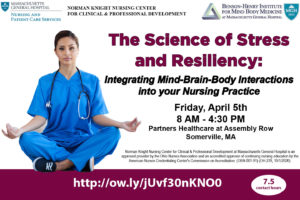
Participation in the course can be applied toward the BHI’s Stress Management and Resiliency Training (SMART) Certification for Healthcare Practitioners program. https://bensonhenryinstitute.org/
For more information or to register, visit http://ow.ly/jUvf30nKNO0 or email jmeek@partners.org.
The Norman Knight Nursing Center for Clinical & Professional Development at Massachusetts General Hospital is an approved provider by the Ohio Nurses Association an accredited approver of continuing nursing education by the American Nurses Credentialing Center’s Commission on Accreditation. (OBN-001-91). The Knight Center has approved 7.5 contact hours.
Criteria for successful completion include: electronic check-in or paper sign-in at the beginning of the program, attendance at the entire event and submission of a completed evaluation.
There is no conflict of interest for anyone in a position to control the content of this activity.
Register Now for The Herbert Benson, MD Course in Mind Body Medicine Nov 9-11, 2023
November 9-11, 2023, In-Person AND Live Streaming
Registration is now open for The Herbert Benson, MD Course in Mind Body Medicine, the Benson-Henry Institute’s celebrated continuing medical education (CME) course offered in partnership with Harvard Medical School.
The course will be held live, in-person November 9-11, 2023, at the Renaissance Waterfront Hotel in Boston, MA and live-streamed to participants around the world. Video recordings of all talks will be available to all conference-goers for up to 60 days. BHI is also pleased to offer an optional online pre-course workshop, Group Medical Visits to Guide Patients to Healthier Lifestyle Behaviors.
“The Herbert Benson Course in Mind Body Medicine is an opportunity for clinicians, researchers, scientists and mind body enthusiasts to explore the latest research and learn the best techniques in mind body medicine. Our work – providing patients with skills to build resilience and improve wellbeing – are essential as we rebound from the pandemic and face a multitude of other stressful challenges at home and abroad. We are so pleased to be able to meet each other again in person this fall, and to provide online streaming to participants around the world. The course provides a wonderful opportunity to connect and collaborate with colleagues around the world,” said BHI Director Gregory Fricchione, MD. “We have an impressive line-up of keynotes and experts in the field, and this year we are offering an exciting new optional half-day course on delivering mind body medicine in group visits.”
Keynote speakers are renowned social scientist and best-selling author Nicholas Christakis, MD, PhD, MPH of Yale University; Lisa Feldman Barrett, PhD, psychology and neuroscience researcher and author of How Emotions are Made; Fr. Laurence Freeman, OSB, the worldwide leader of the World Community for Christian Meditation and a Benedictine monk; Thupten Jinpa, PhD, founder of The Compassion Institute and principal translator to H.H. the Dalai Lama; and Jacque Salomon, co-founder of the Seeds to Inspire Foundation of Arizona and an advocate for plant-based nutrition and education in marginalized communities.
This program is among the highest-rated Harvard Medical School CME courses. The Harvard Medical School is accredited by the Accreditation Council for Continuing Medical Education (ACCME) to provide continuing medical education for physicians. The Harvard Medical School designates this live activity for a maximum of 23.00 AMA PRA Category 1 Credits™. Physicians should claim only the credit commensurate with the extent of their participation in the activity. For additional accreditation information, please see below. Register before September 30th to receive an early bird discount.
Participants will get
- The latest clinical approaches and integrative models of care
- Cutting-edge research into the linkages between the brain and the body
- Education on genomics, transcriptomics, metabolomics ad how to leverage recent advances in the neuroimaging of contemplative states
- Current data on stress, stress management and resilience enhancement, and their impacts on patient health and treatment options
For course scheduling, information and to register, please visit mindbody.hmscme.com. Register by September 30th for an early bird discount.
About our Keynotes
 Nicholas Christakis, MD, PhD, MPH, is a social scientist and physician at Yale University who conducts research in the fields of network science, biosocial science, and behavior genetics. His current work focuses on how human biology and health affect, and are affected by, social interactions and social networks. He directs the Human Nature Lab and is the Co-Director of the Yale Institute for Network Science. He is the Sterling Professor of Social and Natural Science, appointed in the Departments of Sociology; Medicine; Ecology and Evolutionary Biology; Biomedical Engineering; and the School of Management.
Nicholas Christakis, MD, PhD, MPH, is a social scientist and physician at Yale University who conducts research in the fields of network science, biosocial science, and behavior genetics. His current work focuses on how human biology and health affect, and are affected by, social interactions and social networks. He directs the Human Nature Lab and is the Co-Director of the Yale Institute for Network Science. He is the Sterling Professor of Social and Natural Science, appointed in the Departments of Sociology; Medicine; Ecology and Evolutionary Biology; Biomedical Engineering; and the School of Management.
Dr. Christakis received his BS from Yale in 1984, his MD from Harvard Medical School and his MPH from the Harvard School of Public Health in 1989, and his PhD from the University of Pennsylvania in 1995. He was elected to the National Academy of Medicine in 2006; the American Association for the Advancement of Science in 2010; and the American Academy of Arts and Sciences in 2017.
One body of work in his lab focuses on how health and health behavior in one person can influence analogous outcomes in a person’s social network. This work involves the application of statistical and mathematical models to understand the dynamics of diverse phenomena in longitudinally evolving networks. A related body of work uses experiments to examine the spread of altruism, emotions, and health behaviors along network connections online and offline, including with large-scale field trials in the developing world directed at improving public health (e.g., in Honduras and India). His lab has also examined the genetic and evolutionary determinants of social network structure, showing that social interactions have shaped our genome, with related projects that have mapped networks of populations in Tanzania and Sudan who live as all humans did 10,000 years ago. His most recent work has used artificial intelligence (AI) agents (“bots”) to affect social processes online.
Dr. Christakis is the author of over 200 articles and several books. His influential book, Connected: The Surprising Power of Our Social Networks and How They Shape Our Lives, documented how social networks affect our lives and was translated into twenty foreign languages. His most recent book, Blueprint: The Evolutionary Origins of a Good Society, was published in March 2019 and is slated to appear in German, Chinese, Dutch, and Greek, and other languages.
In 2009, Christakis was named by Time magazine to their annual list of the 100 most influential people in the world. In 2009 and in 2010, he was listed by Foreign Policy magazine in their annual list of Top 100 Global Thinkers.
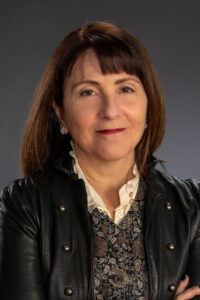 Lisa Feldman Barrett, PhD, is a University Distinguished Professor of psychology at Northeastern University with appointments at the Massachusetts General Hospital (MGH) and Harvard Medical School. Dr. Barrett is among the top 1% most-cited scientists worldwide for her research in psychology and neuroscience, having published over 270 peer-reviewed scientific papers.
Lisa Feldman Barrett, PhD, is a University Distinguished Professor of psychology at Northeastern University with appointments at the Massachusetts General Hospital (MGH) and Harvard Medical School. Dr. Barrett is among the top 1% most-cited scientists worldwide for her research in psychology and neuroscience, having published over 270 peer-reviewed scientific papers.
She has received numerous awards, including a Director’s Pioneer Award for transformative research from the US National Institutes of Health, a Guggenheim Fellowship in neuroscience, Mentor Awards from the Association for Psychological Science (APS) and the Society for Affect Science (SAS), and the Distinguished Scientific Contribution Award from the American Psychological Association (APA). Dr. Barrett is an elected fellow of the American Academy of Arts and Sciences, the Royal Society of Canada, and a number of other honorific societies.
She has testified before the US Congress, is the Chief Science Officer for the Center for Law, Brain and Behavior at MGH, has served as president of the Association for Psychological Science, co-founded the Society for Affective Science, and actively engages in informal science education for the public via popular books, articles and public lectures. She has authored two best-selling popular science books, How Emotions are Made: The Secret Life of the Brain and Seven and a Half Lessons About the Brain. Her TED talk has been viewed more than 6.5 million times to date. Colleagues have called Dr. Barrett “the most important affective scientist of our time” and “the deepest thinker on <the nature of emotion> since Darwin.”
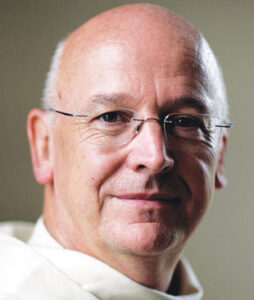 Fr. Laurence Freeman, OSB – is currently the worldwide leader of the World Community for Christian Meditation. He was born in England in 1951 where he was educated by the Benedictines and studied English Literature at New College, Oxford University. Before entering monastic life, he had experience with the United Nations in New York, banking and journalism.
Fr. Laurence Freeman, OSB – is currently the worldwide leader of the World Community for Christian Meditation. He was born in England in 1951 where he was educated by the Benedictines and studied English Literature at New College, Oxford University. Before entering monastic life, he had experience with the United Nations in New York, banking and journalism.
In the monastery, his spiritual teacher was Fr. John Main. He helped Fr. John establish the first Christian Meditation Centre in London. At the invitation of the Archbishop of Montreal, in 1977, he accompanied Fr. John to establish a Benedictine community of monks and laypeople dedicated to the practice and teaching of Christian meditation. Fr. Laurence studied theology at the Universite de Montreal and at McGill University. He made his solemn monastic profession in 1979 and was ordained to the priesthood in 1980. After the death of John Main in 1982, he continued the work of teaching meditation that had already begun, and to develop a global community.
In 1991, Fr Laurence returned to England to establish the International Centre of the World Community for Christian Meditation, with groups now present in more than a hundred countries and which has become a ‘monastery without walls’, as Fr. John envisioned it. He travels regularly in North and South America, Europe, Australia and Asia. He is involved in the contemplative inter-religious dialogue and led The Way of Peace dialogue with the Dalai Lama. He is the author of a number of books, among others: Jesus the Teacher Within, Light Within, A Short Span of Days and The Selfless Self.
Thupten Jinpa, PhD – Thupten Jinpa, Ph.D. is the Founder and Chairman of Compassion Institute, and the principal author of Compassion Cultivation Training™ (CCT©), the Institute’s 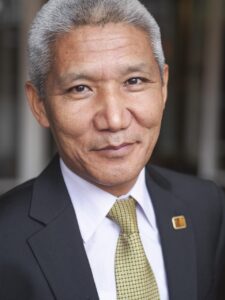 flagship compassion education offering, developed while Jinpa was at Stanford University.
flagship compassion education offering, developed while Jinpa was at Stanford University.
Jinpa trained as a monk at the Shartse College of Ganden Monastic University, South India, where he received the Geshe Lharam degree. Jinpa also holds a B.A. in philosophy and a Ph.D. in religious studies, both from Cambridge University.
Jinpa has been the principal English translator to H.H. the Dalai Lama since 1985 and has translated and collaborated on numerous books by the Dalai Lama including the New York Times Bestsellers Ethics for the New Millennium and The Art of Happiness, as well as Beyond Religion: Ethics for a Whole World. His own publications include A Fearless Heart: How the Courage to be Compassionate Can Transform Our Lives and translations of major Tibetan works featured in The Library of Tibetan Classics series.
A frequent speaker at various international conferences on mindfulness, compassion, and contemplative practice, Jinpa also serves as an adjunct professor at the Faculty of Religious Studies at McGill University, Montreal and is the founder and president of the Institute of Tibetan Classics. He has been a core member of the Mind and Life Institute and its Chairman of the Board since January 2012.
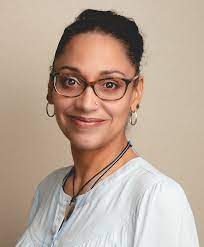 Jacque Salomon – Jacque Salomon is the co-founder of Seeds to Inspire Foundation of Arizona and an advocate for plant-based nutrition and education in marginalized communities.
Jacque Salomon – Jacque Salomon is the co-founder of Seeds to Inspire Foundation of Arizona and an advocate for plant-based nutrition and education in marginalized communities.
Born and raised on the ancestral lands of the Lenape people (Manhattan, NY), Jacque lives on the home of the Akimel O’odham and Piipaash people (Phoenix, AZ). She is an American College of Lifestyle Medicine (ACLM) Health Equity Achieved through Lifestyle Medicine (HEAL) Initiative Committee Member, collaborator/supporter to Let Our Ancestors Rest Campaign, Founding Board Member of SimpleVeg, Board Member for Eat for the Earth 501(c)(3), former Pod Advisory Committee Member for PlantPure Communities and proud former Community Liaison to Stand Up ASU student club. She shares her work and healing journey as a Speaker and supports individuals as a Transformational Coach.
Jacque received her Certificate in Plant-Based Nutrition from the T. Colin Campbell Center for Nutrition Studies, is a Certified Conscious Parenting Coach and studied in collective and racialized trauma resilience. She uses these modalities to support individuals and communities arrest and reverse the consequences of the imposed colonial lifestyle on Mind, Body and Spirit and achieve their multidimensional health goals.
Through a Whole Plant Foods Lifestyle, meditation, yoga, and psycho-spiritual remediation, she arrested and reversed her own chronic diseases — such as Type 2 Diabetes, Hypertension, and GERD — and shed 164 lbs. Realizing the profound power we have over our own health, as well as the autonomy she regained over her own body and well-being, Jacque is determined to bring her story and support to communities most at-risk for future pandemics and climate destabilization.
Jacque’s gratitude and health are channeled into her work as a Lifestyle Medicine Practitioner and Intersectional Activist supporting historically marginalized communities in the Phoenix metropolitan area and surrounding reservations. Her work is focused on bringing Whole Plant Food Nutrition literacy, whole plant food access and affordability and trauma-resiliency and support to underfinanced, underserved communities by collaborating with grassroots organizations devoted to healing our most distressed zip codes.
ADDITIONAL ACCREDITATION INFORMATION:
In support of improving patient care, Harvard Medical School is jointly accredited by the Accreditation Council for Continuing Medical Education (ACCME), the Accreditation Council for Pharmacy Education (ACPE), and the American Nurses Credentialing Center (ANCC), to provide continuing education for the healthcare team.
Physicians
The Harvard Medical School designates this live activity for a maximum of 22.25 AMA PRA Category 1 Credits™. Physicians should claim only the credit commensurate with the extent of their participation in the activity.
- Main 3-day course, Mind Body Medicine 2023 (Nov. 9–11): 20.25 AMA PRA Category 1 Credits™
- Optional online pre-course, Group Medical Visits (Nov. 8): 2.75 AMA PRA Category 1 Credits™
Nurse Practitioners and Registered Nurses
Harvard Medical School designates this live activity for a maximum of 23.00 ANCC contact hours.
Psychologists
Continuing Education (CE) credits for psychologists are provided through the co-sponsorship of the American Psychological Association (APA) Office of Continuing Education in Psychology (CEP). The APA CEP Office maintains responsibility for the content of the programs.
Social Workers
As a Jointly Accredited Organization, Harvard Medical School is approved to offer social work continuing education by the Association of Social Work Boards (ASWB) Approved Continuing Education (ACE) program. Organizations, not individual courses, are approved under this program. Regulatory boards are the final authority on courses accepted for continuing education credit. Social workers completing this course receive 23.00 general continuing education credits.
RISK MANAGEMENT
This activity meets the criteria of the Massachusetts Board of Registration in Medicine for 2.00 credits of Risk Management Study. This includes:
- 1 credit of Medical Marijuana Training
Please check your individual state licensing board requirements before claiming these credits.
PHYSICIAN ASSISTANTS
The National Commission on Certification of Physician Assistants (NCCPA) states that AMA PRA Category 1 Credits™ are acceptable for continuing medical education requirements for recertification. We would also suggest that learners check with their state licensing board to ensure they accept reciprocity with AMA PRA Category 1 Credit™ for re-licensure.
CANADIAN ACCREDITATION
The Royal College of Physicians and Surgeons of Canada recognizes conferences and workshops held outside of Canada that are developed by a university, academy, hospital, specialty society or college as accredited group learning activities.
EUROPEAN ACCREDITATION
The American Medical Association (AMA) has an agreement of mutual recognition of continuing medical education (CME) credit with the European Union of Medical Specialties (UEMS). Additional information regarding this agreement may be found here: https://www.ama-assn.org/education/ama-pra-credit-system/agreement-european-union-medical-specialties-uems
ABMS/ACGME COMPETENCIES
This course is designed to meet the following American Board of Medical Specialties and Accreditation Council of Graduate Medical Education competencies:
- Interpersonal and Communication Skills
- Medical Knowledge
IOM COMPETENCIES
This course is designed to meet the following Institute of Medicine competencies:
- Provide Patient-Centered Care
- Employ Evidence-Based Practice
Disclosure Policy
In accord with the disclosure policy of the Medical School as well as standards set forth by the Accreditation Council for Continuing Medical Education (ACCME), course planners, speakers, and content reviewers have been asked to disclose any relationships they have to companies whose primary business is producing, marketing, selling, re-selling, or distributing healthcare products used by or on patients. In addition, faculty have been asked to list any off-label uses of pharmaceuticals and/or devices for investigational or non-FDA approved purposes that they plan to discuss.
Disclaimer
CME activities accredited by Harvard Medical School are offered solely for educational purposes and do not constitute any form of certification of competency. Practitioners should always consult additional sources of information and exercise their best professional judgment before making clinical decisions of any kind.
Note: AMA PRA Category 1 Credit™ is calculated based on submission of a preliminary agenda and may be subject to change.
Study: Relaxation Response Therapy Reduces Blood Pressure in Hypertension
Researchers identified genes and biological pathways linked to immune regulation, metabolism, and circadian rhythm in people who reduced their hypertension after eight-week relaxation response training.
BOSTON – High blood pressure – or hypertension – is a major risk factor for heart attack and stroke that affects as many as 100 million Americans and 1 billion people worldwide. Decades of research have demonstrated that the relaxation response – the physiological and psychological opposite of the well-known fight-or-flight stress response that can be achieved through relaxation techniques like yoga or mediation – can reduce blood pressure in people with hypertension. Exactly how these interventions act on the body to lower blood pressure remains unclear.
A new study led by investigators at Beth Israel Deaconess Medical Center (BIDMC), Massachusetts General Hospital (MGH), and the Benson-Henry Institute for Mind Body Medicine at MGH identified the genes associated with the body’s response to relaxation techniques and sheds light on the molecular mechanisms by which these interventions may work to lower blood pressure. The findings were published today in the Journal of Alternative and Complementary Medicine. Read the study here.
“Traditionally, hypertension is treated with pharmacologic therapy, but not all patients respond to drug therapy, and many experience treatment-limiting side effects,” said co-senior author Randall Zusman, MD, Director of the Division of Hypertension at MGH. “In these patients, alternative strategies are invaluable. In this study, we found that the relaxation response can successfully help reduce blood pressure in hypertensive patients who are not taking medication.”
Towia Libermann, PhD, Director of the Genomics, Proteomics, Bioinformatics, and Systems Biology Center at BIDMC said, “To our knowledge, this is the first study to test such a mind-body intervention for a population of unmedicated adults with carefully documented, persistent hypertension, and this is the first study to identify gene expression changes specifically associated with the impact of a mind-body intervention on hypertension. Our results provide new insights into how integrative medicine – especially mind-body approaches – influences blood pressure control at the molecular level.”
First described more than four decades ago by Herbert Benson, MD, Director Emeritus of the Benson Henry Institute and a co-author of the current study, the relaxation response is characterized by a set of measurable changes to the body, including decreased respiration rate and heart rate, all of which can be induced by mind-body techniques including meditation and yoga. Long-term relaxation response practice has been associated with increased brain cortical thickness and specific changes in gene expression.
In this study, Libermann, Zusman and colleagues enrolled 58 people with Stage 1 essential hypertension – defined as having a systolic (top number) blood pressure between 140-159mm Hg and diastolic (bottom number) between 90-104mm Hg. Participants were either not taking medications to control their blood pressure or had tapered off them for five weeks prior to the outset of the study. Participants also filled out standardized questionnaires about stress, depression and anxiety.
Over the next eight weeks, participants attended eight weekly training sessions at which they were guided through mind-body interventions designed to elicit the relaxation response – including diaphragmatic breathing, mantra repetition and mindfulness meditation –while passively ignoring intrusive thoughts. Participants were also given an audio CD that guided them through the same sequence for use at home once a day.
After the eight weeks of training, patients filled out the same stress, depression and anxiety questionnaires and had blood drawn for gene expression testing along with blood pressure measurement. Overall, 13 of the 24 participants who completed the eight-week intervention experienced a clinically relevant drop in blood pressure – that is, specific reductions in both systolic and diastolic blood pressure readings that moved participants below 140/90 mm Hg, the clinical definition of stage 1 hypertension.
Patients who demonstrated significant reductions in both systolic and diastolic blood pressure – enough so that their blood pressure was below the definition of Stage I essential hypertension – were classified as “responders.” Those whose blood pressure still fell within the definition of Stage I hypertension – and those who did not see reduction in both numbers – were classified as “non-responders.”
When Libermann and colleagues ran gene expression analyses comparing blood samples from the two groups, they found that specific gene expression changes had occurred in the responders over the course of the eight-week relaxation response intervention that were not observed in the non-responders. Specifically, among responders the expression of 1,771 genes differed between the baseline blood tests and those taken after the eight weeks of relaxation response practice. Further, Libermann and colleagues determined that the reduction in blood pressure was correlated with genes linked to immune regulatory pathways, metabolism and glucose metabolism, cardiovascular system development and circadian rhythm.
“Interactive network analysis of the gene signature identified several molecules, particularly immune system-linked genes, as critical molecules for blood pressure reduction,” said first author Manoj Bhasin, PhD, Co-Director of the Genomics, Proteomics, Bioinformatics, and Systems Biology Center at BIDMC.
“Our results suggest that the relaxation response reduced blood pressure – at least in part – by altering expression of genes in a select set of biological pathways,” co-first author John Denninger, MD, PhD, Director of Research at the Benson-Henry Institute, noted. “Importantly, the changes in gene expression associated with this drop in blood pressure are consistent with the physical changes in blood pressure and and inflammatory markers that one would anticipate and hope to observe in patients successfully treated for hypertension.”
In addition to Zusman and Libermann, investigators included co-first author Manoj Bhasin and Marie Joseph of Beth Israel Deaconess Medical Center; co-first author John Denninger, Jeffrey Huffman, Halsey Niles, Emma Chad-Friedman, Roberta Goldman, Beverly Buczynski Kelley, Barbara Mahoney, Gregory Fricchione and Herbert Benson of Massachusetts General Hospital and Benson-Henry Institute for Mind Body Medicine at MGH; and Jeffery Dusek of Abbott Northwestern Hospital, Institute for Health and Healing.
This study was funded by a grant from the Centers for Disease Control and Prevention (R01 DP000339).
About Beth Israel Deaconess Medical Center
Beth Israel Deaconess Medical Center is a patient care, teaching and research affiliate of Harvard Medical School and consistently ranks as a national leader among independent hospitals in National Institutes of Health funding.
BIDMC is in the community with Beth Israel Deaconess Hospital-Milton, Beth Israel Deaconess Hospital-Needham, Beth Israel Deaconess Hospital-Plymouth, Anna Jaques Hospital, Cambridge Health Alliance, Lawrence General Hospital, MetroWest Medical Center, Signature Healthcare, Beth Israel Deaconess HealthCare, Community Care Alliance and Atrius Health. BIDMC is also clinically affiliated with the Joslin Diabetes Center and Hebrew Rehabilitation Center and is a research partner of Dana-Farber/Harvard Cancer Center and the Jackson Laboratory. BIDMC is the official hospital of the Boston Red Sox. For more information, visit www.bidmc.org.
Massachusetts General Hospital
Massachusetts General Hospital, founded in 1811, is the original and largest teaching hospital of Harvard Medical School. The MGH Research Institute conducts the largest hospital-based research program in the nation, with an annual research budget of more than $900 million and major research centers in HIV/AIDS, cardiovascular research, cancer, computational and integrative biology, cutaneous biology, genomic medicine, medical imaging, neurodegenerative disorders, regenerative medicine, reproductive biology, systems biology, photomedicine and transplantation biology. The MGH topped the 2015 Nature Index list of health care organizations publishing in leading scientific journals and earned the prestigious 2015 Foster G. McGaw Prize for Excellence in Community Service. In August 2017 the MGH was once again named to the Honor Roll in the U.S. News & World Report list of “America’s Best Hospitals.”
The Benson-Henry Institute for Mind Body Medicine in the Department of Psychiatry at MGH was established in 2006 to improve the clinical care of MGH patients through the application of mind body integrative medicine approaches and to improve our understanding of the mechanisms involved through basic and clinical research.
Ramp up your resilience
By Harvard Health Publishing
The ability to bounce back from stress or adversity is important throughout life, especially in our older years. That’s when we face many transitions, such as health problems; job, income, and home changes; the loss of loved ones; and isolation or separation from friends, grown children, and grandchildren. How we adjust to these changes helps determine what life will look like moving forward. “Many people are living longer, and we want to make the most of these years so people can thrive,” says Laura Malloy, the Successful Aging program director at the Harvard-affiliated Benson-Henry Institute for Mind Body Medicine.
The benefits of resilience
Coping with stress in a positive way is known as resilience, and it has many health benefits. It’s associated with longevity, lower rates of depression, and greater satisfaction with life. “There’s a sense of control, and it helps people feel more positive in general,” Malloy says.
Likewise, a lack of resilience means that you may not handle stress well in difficult situations. Chronic stress is associated with harmful health consequences such as high blood pressure, a weakened immune system, anxiety, depression, insomnia, heartburn, indigestion, and heart disease
Click HERE to read the full article
International Day of Yoga at MGH – June 21, 2018
In celebration of International Yoga Day, the Benson-Henry Institute for Mind Body Medicine at MGH is pleased to invite the entire community to hear Jeffery Dusek, PhD present “Kripalu’s RISE: A Yoga-Based Mindfulness Program for Healthcare Professionals, Educators and Frontline Professionals.” This presentation will be held Thursday, June 21st from 1 PM to 2:15 PM in the MGH Ether Dome.
Since its inception in 2015, the International Day of Yoga has served as an opportunity to study and celebrate the physical, mental and spiritual practice of yoga. In Massachusetts, the celebration precedes the 3rd International Conference on Integrative Medicine: Role of Yoga and Ayurveda in Cancer and Palliative Care, which will be held June 22-24, 20198 at the Joseph Martin Conference Center at Harvard Medical School.
Dr. Dusek, the Chief Research Officer at Kripalu Center for Yoga & Health in Stockbridge, MA, will discuss the ways in which mindfulness and yoga practices can help healthcare providers balance life and work. Dr. Dusek has been a longtime research collaborator with the Benson-Henry Institute for Mind Body Medicine (BHI) at Massachusetts General Hospital, is a recent appointee of MGH’s Department of Psychiatry.
This is why we should all start breathing
By Remy Rippon
Vogue Australia
Inhale and exhale.
‘You should really meditate’. It’s a phrase you’ve probably heard a handful of times from that friend who seems to exude endless zen by taking 20 minutes out of their daily routine to calm their mind, centre their body, and simply breathe. And, who loves to share just how great it is. Well, as it turns out, they’re not wrong.
In fact, breathing is having a moment. There are apps to help you do it correctly (btw, there’s a right and wrong way), and the Apple Watch Series 2 even houses the Breathe app which pings you a notification to remind you to stop and take a moment out of your busy lives to, well, breathe.
Click HERE to read the full article
BHI and MGH Celebrate International Day of Yoga
The Benson-Henry Institute (BHI) and Massachusetts General Hospital (MGH) celebrated the International Day of Yoga with thousands of employees at the hospital’s annual Employee Appreciation Picnic June 21st. BHI serves as the hospital’s center of integrative health and wellness, offering yoga and tai chi classes, guided meditations and Stress Management and Resiliency Training (SMART) programs.
At the employee picnic, BHI staffers provided information on the institute’s programmatic offerings, provided de-stress and chair yoga information and Director of Yoga Programs Laura Malloy, LICSW demonstrated gentle yoga moves to the thousands of employees who visited the booth on the Bullfinch Lawn.
“This was a wonderful setting to share information about the benefits of yoga and connect with those who have a practice or would like to start a yoga practice,” said Laura Malloy, LICSW, BHI’s Director of Yoga Programs.
Celebrations were held in more than 180 recognizing the importance of Yoga, the 5,000-year-old physical, mental and spiritual practice that got its start in India. Yoga is an important of self-care, and can help to slow the effect of stress and aging on both the body and mind. The celebration at MGH was supported by hospital administration, including MGH President Dr. Peter Slavin and was acknowledged by Shiripad Naik, Minister of State (Independent Charge) for the Government of India’s State for Ayurveda, Yoga and Naturopathy (Ministry of AYUSH).
BHI is pleased about a burgeoning relationship with AYUSH; this spring, Medical Director Darshan Mehta, MD, MPH helped organize a symposium on Integrative Medicine and the Role of Yoga and Ayurveda at Harvard Medical School. The symposium drew hundreds of participants from around the world. Participants included Dinesh Patel, MD, Emeritus Chief of Arthroscopic Surgery at MGH, BHI Director Dr. Gregory Fricchione and Research Director John W. Denninger, MD, PhD.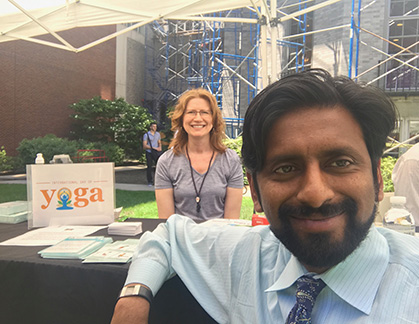
“Our founder, Dr. Herbert Benson, was one of the first doctors in the Western Hemisphere to recognize the importance of eastern practices in managing stress and improving health. Many of the mind body practices that we recommend have origins in India and its very exciting to see that come full circle,” Dr. Mehta said. “We’ve adopted these eastern practices and studied their efficacy in scientific practice. There’s a beautiful irony in being part of this new partnership.”

BHI Hosts Annual Mind Body CME October 19-21, 2017
BHI will host its annual conference at Harvard Medical School October 19-21, 2017. This year’s course, “Mind Body Medicine: Guiding Patients to Health and Happiness,” will provide hundreds of clinicians and mind body practitioners from across the globe an opportunity to explore cutting-edge research, share best practices and discover new strategies for treating patients. The 2 ½ day Continuing Medical Education (CME) course will be held at the Joseph Martin Conference Center in Boston.
The conference will feature a joint presentation by BHI founder Dr. Herbert Benson (author of “The Relaxation Response,” a groundbreaking work of mind body medical literature) and Jon Kabat-Zinn, PhD, whose pioneering work in the field led him to coin the phrase “mindfulness” and found the Center for Mindfulness at the University of Massachusetts Medical School, Worcester. BHI Director Dr. Gregory Fricchione will present “Evolutionary Mind Body Medicine: Implications for Health and Well-Being.”
Keynote speakers Amy Cuddy, PhD and Robert Waldinger, MD are Harvard professors and TEDtalk phenoms who between them have more than 50 million views. Dr. Cuddy’s 2015 book “Presence: Bringing your Boldest Self to your Biggest Challenges,” explores how harnessing inner strength can help propel individuals to greater success. A professor of psychology at Harvard, Dr. Cuddy is perhaps best known for her TEDtalk about “the power pose,” which discusses how one’s carriage can influence interpersonal relationships. Dr. Waldinger directs the Harvard Study of Adult Development, one of the longest longitudinal studies of adult life ever done. Dr. Waldinger’s research focuses on the lifetime predictors of healthy adult development, studying two groups of men recruited as teenagers from Harvard College and from Boston inner city neighborhoods, and who have been part of the Study for 76 years.
The BHI is proud to feature members of the Healing Emergency Aid Response Team 9/11 (H.E.A.R.T. (9/11). The team of New York-area police, fire, emergency medical and building trades personnel responded in the aftermath of the September 11, 2001 attack; their shared experiences bonded the members and propelled them to share their strategies for responding to crises with other first responders around the country. HEART 9/11’s mission is to respond to natural and man-made disasters, help those affected to rebuild and recover by teaching resiliency skills to individuals and families.
Registration for the course will be conducted through Harvard Medical School. For more information or to register, please click here.
This offering meets the criteria for 22.25 Continuing Medical Education (CME) credits for physicians. The institute is applying for Continuing Education (CE) credit(s) for nurses and psychologists, and for credit hours for social workers and counselors.
*Note to New York state social workers: BHI has applied to become an approved CME provider. Please check back for more information.
The Herbert Benson, MD Course in Mind Body Medicine – Oct 25-27
The Benson-Henry Institute’s annual Continuing Medical Education (CME) course will be held October 25-27, 2018 at Harvard Medical School. Since its launch more than 30 years ago, the course has provided thousands of clinicians and mind body practitioners from across the globe an opportunity to explore cutting-edge research, share best practices and discover new strategies for treating patients.
This year’s course will be historic, as it is the first year it is being named in honor of Herbert Benson, MD, renowned mind body pioneer and founder of the institute.
“Dr. Benson pioneered a new area of research; in modern science, his approach was unique – a western scientist willing to investigate ancient traditional approaches to health,” said BHI Director Gregory Fricchione, MD. “Dr. Benson came to understand that to maximize our patients’ chances of achieving health and wellness, we physicians, nurses and caregivers needed to help them advance their self-care. No longer would pharmaceuticals and procedures be sufficient. This, year we are proud to name our annual Benson-Henry institute/Harvard continuing medical education course in mind body medicine after Dr. Benson, our director emeritus.”
The 3-day Herbert Benson, MD Course in Mind Body Medicine will be held at the Joseph Martin Conference Center in Boston. Keynote speakers are Richard Davidson, PhD and Joan Borysenko, PhD.
The founder and director of the Center for Healthy Minds at the University of Wisconsin, Dr. Davidson is a neuroscientist whose research centers on emotion and the brain. His most recent book (with coauthor Dan Goleman, PhD), Altered Traits: Science Reveals How Meditation Changes Your Mind, Brain, and Body, was published last year. A professor of psychology and psychiatry, Dr. Davidson was named one of the 100 most influential people in the world by TIME magazine in 2006.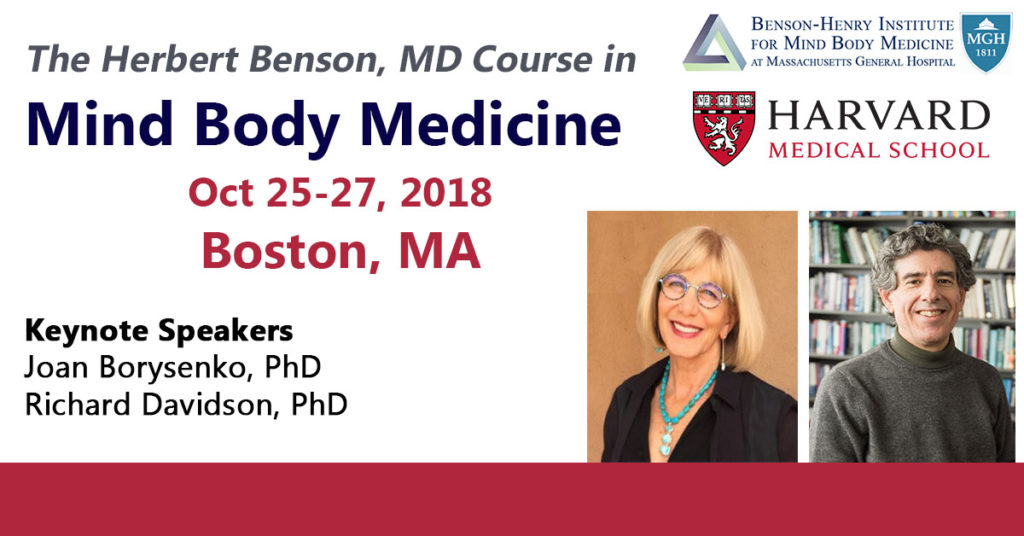
Dr. Borysenko is a Harvard-trained psychologist and internationally-recognized expert in the mind-body connection. She is the author of the New York Times bestseller Minding the Body, Mending the Mind, and a former colleague of Dr. Benson’s. A celebrated and uplifting public speaker, Dr. Borysenko is a blogger for the Huffington Post; her work has also appeared has appeared in outlets from The Washington Post to The Wall Street Journal.
The Herbert Benson, MD Course in Mind Body Medicine will focus on the latest research into the links between mind/brain and body and how the human being functions as a unit. Evidence-based practices that help us deal with stress related non-communicable diseases will be highlighted. Attendees will be able to take part in meditation workshops, tai chi and yoga sessions, and build skills through interactive workshops and panel discussions that support stress reduction and the enhancement of resiliency. Topics include mind body approaches to sleep, nutrition and exercise; how narrative story telling can help patients reframe their sense of wellbeing; ways to build your own mind body clinic; insight into our Stress Management and Resiliency Training (SMART) program; integrative approaches to reducing burnout in healthcare providers; and the importance of self-care, among others.
Speakers include mindfulness researcher Dr. Judson Brewer, author of The Craving Mind, happiness expert Robert Waldinger, MD, noted sleep researcher Suzanne M. Bertisch, MD, MPH and acceptance and commitment therapy expert Dr. John Matthews, among others. Our BHI leadership team – including Drs. Benson and Fricchione – will also present latest in mind body medicine research.
The Harvard Medical School designates this live activity for a maximum of 23.5 AMA PRA Category 1 Credits™. The Benson-Henry Institute will also apply for Continuing Education (CE) credit(s) for nurses and psychologists and for credit hours for social workers.
This program has been approved for 23.5 Social Work Continuing Education hours for relicensure, in accordance with 258 CMR. Collaborative of NASW and the Boston College and Simmons Schools of Social Work Authorization Number D 80092.
The Massachusetts General Hospital, Department of Psychiatry is approved by the American Psychological Association to offer continuing education for psychologists. The Massachusetts General Hospital, Department of Psychiatry, maintains responsibility for the program and its content. This offering meets the criteria for 18.5 Continuing Education (CE) credit(s) for psychologists.
This continuing nursing education activity was approved by the American Nurses Association Massachusetts (ANA MASS), an accredited approver by the American Nurses Credentialing Center’s Commission on Accreditation. The Herbert Benson, MD Course in Mind Body Medicine, has been approved for 23.5 contact hours.
Registration for the course is conducted through Harvard Medical School. For more information on this course, please visit mindbody.hmscme.com or email jmeek@partners.org.
1-Day Mind Body Nursing CME – April 9th
The Benson-Henry Institute for Mind Body Medicine (BHI) is pleased to invite nurses and healthcare clinicians to its upcoming continuing medical education program, The Science of Stress and Resiliency: Integrating Mind-Brain-Body Interactions into your Nursing Practice.
The program is offered under the auspices of the Norman Knight Nursing Center for Clinical & Professional Development at Massachusetts General Hospital and will be held Monday, April 9th from 8 AM to 5 PM at Partners Healthcare at Assembly Row, Somerville.
“There aren’t enough drugs or interventions to keep us healthy. Understanding the physiology of stress and the mechanisms and interventions that counter its harmful influence is needed for prevention and treatment of illness and for overall vitality and resiliency. This is an excellent opportunity for nurses to learn how the science of stress affects the brain and body and to develop self-care skills they can teach patients and utilize themselves to build resiliency and reduce burnout,” said course director Peg Baim, MS, NP.
Participants will hear the latest research into the science of stress and how it affects the body at the genomic level, understand how lifestyle behaviors can positively impact health outcomes and build resiliency, build skills in meditation, understand cognitive reappraisal and take part in mind body practices like yoga.
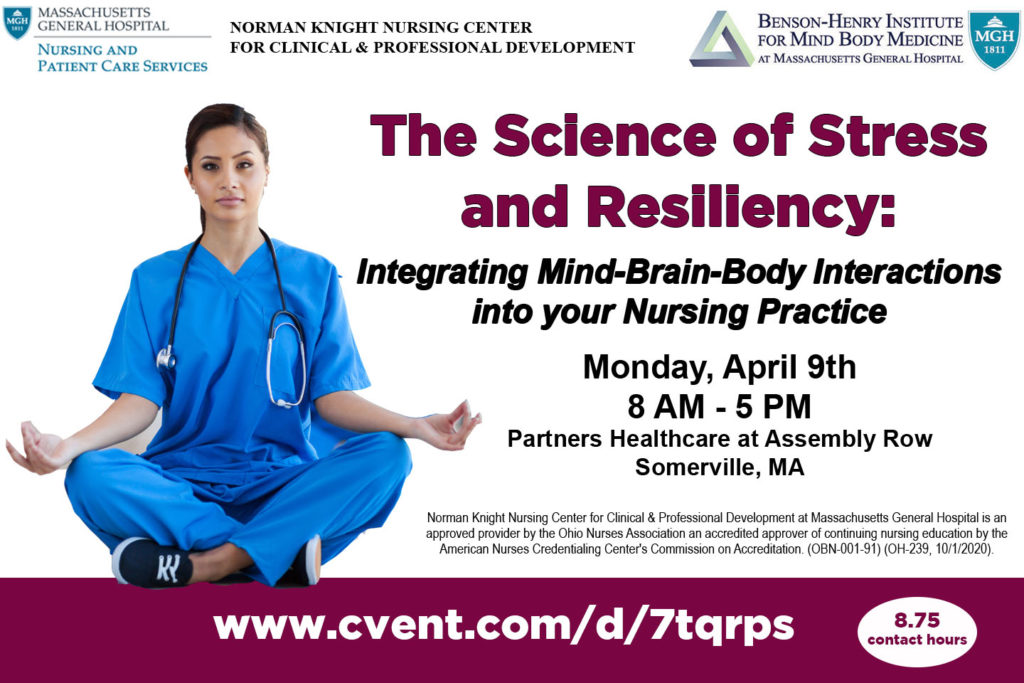
Speakers include BHIS’s Clinical Director of Training, Peg Baim, MS, NP; BHI’s Director of Research, John W. Denninger, MD, PhD; Laura Malloy, LICSW, RYT, Director of Yoga Programs at BHI; and Boston-area nursing leaders Patricia Martin Arcari, PhD, RN, AHN-BC, Program Manager of the Zakim Center for Integrative Therapies at Dana-Farber Cancer Institute; Joanne Rowley, RN, MS, HNB-BC, Clinical Nurse Specialist and Holistic Nurse at MGH Revere; and Women’s Health specialist Leslee Kagan, MS, FNP-BC.
Participation in the course can be applied toward the BHI’s Stress Management and Resiliency Training (SMART) Certification for Healthcare Practitioners program. For more information or to register, visit www.cvent.com/d/7tqrps or email jmeek@partners.org.
Norman Knight Nursing Center for Clinical & Professional Development at Massachusetts General Hospital is an approved provider by the Ohio Nurses Association an accredited approver of continuing nursing education by the American Nurses Credentialing Center’s Commission on Accreditation. (OBN-001-91) (OH-239, 10/1/2020). The Knight Center has awarded 8.75 contact hours.



